Angela Slatter's Blog, page 24
December 18, 2018
Christmasy Goodness
Looking for Christmas presents? Fairytales, horror, supernatural crime, urban fantasy, or a mix of them all? In an unrelated comment, I wrote all these books and you find them by the simple expedient of doing the Google or heading to @pulpfictionbks if you’re in Brisneyland.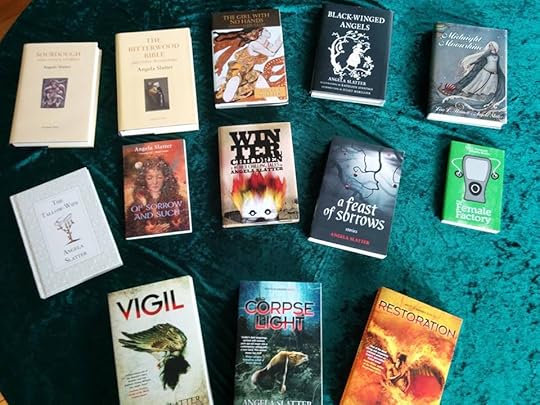
November 30, 2018
Podcasty Goodness

Artification, as always, by the wonderful Kathleen Jennings
A few of my stories have been made into podcasts by the likes of the fabtacular PseudoPod and Tales to Terrify, so I thought I’d bring all the links together in one convenient post.
This is it.
“Cuckoo” at Pseudopod http://pseudopod.org/2017/10/20/pseudopod-565-cuckoo/
“The Little Match Girl” Pseudopod http://pseudopod.org/2008/03/13/flash-the-little-match-girl/
“The Heart is a Mirror for Sinners” Tales to Terrify http://talestoterrify.com/1417-2/
“Bluebeard” Tales to Terrify http://talestoterrify.com/tales-to-terrify-189-preston-chapman/
“Sourdough” Tales to Terrify http://talestoterrify.com/tales-to-terrify-204-slatter-williams/
“The Bones Remember Everything” Tales to Terrify http://talestoterrify.com/tales-to-terrify-no-36-maria-alexander-angela-slatter/
Coming some time in 2019 is “Home and Hearth” at Pseudopod.
November 29, 2018
2018 in review
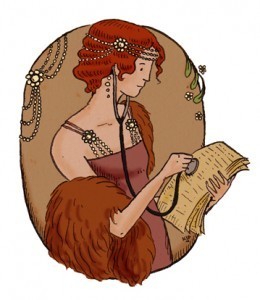 Having spent yesterday excavating my desk for the purposes of organisation (resulting in a list of 32 items to do, 8 of which I managed to cross off yesterday eve), I’ve spent the morning crossing 3 more off said list and procrastinating by making this summary list.
Having spent yesterday excavating my desk for the purposes of organisation (resulting in a list of 32 items to do, 8 of which I managed to cross off yesterday eve), I’ve spent the morning crossing 3 more off said list and procrastinating by making this summary list.
It’s almost December so I figure it will help me to remember that I have actually achieved a few things in the last twelve months, even if it’s not as much as my (unreasonable, over-achieving) inner voice would like.
2018 Summary
Publications
1 novel: Restoration from Jo Fletcher Books.
5 new short stories: “Honor Thy Mother” in Hark! The Herald Angels Scream; “A Matter of Light” in Gaslight Gothic: Eerie Tales of Sherlock Holmes; “When We Fall We Forget” in Phantoms; “Into the Dreamlands” in The Lovecraft Squad: Dreaming; “Swan Girls” in the paperback edition of Corpselight.
9 short story reprints: “The Little Mermaid, in Passing” in The Year’s Best Dark Fantasy and Horror 2018; “No Good Deed” in Best New Horror #29; “Home and Hearth” translated into French for Ténèbres; “Home and Hearth” translated into Chinese in Science Fiction World; “Better Angels” in The Dark; “St Dymphna’s School for Poison Girls” translated into Chinese in Science Fiction World; “The Coffin-Maker’s Daughter” in Sunspot Jungle; “The October Widow” in The Mammoth Book of Halloween Stories; “Let The Words Take You” in Her Dark Voice.
Wrote Introductions for:
Stephen King’s The Tommyknockers (PS Limited edition)
J.S. Breukelaar’s Collision (Meerkat Press)
Simon Dewar’s Suspended in Dusk II (Grey Matter Press)
Paul Kane’s Scary Tales (Things In The Well Press)
Taught:
Australian Writers Centre (Sydney): Short Story in One Day workshop (x2); Editing and Auditing for Writers masterclass
Australian Writers Centre (Brisbane): Short Story in One Day workshop; Creative Writing #1 Weekend Intensive (x2)
Townsville Writers & Publishers Centre: Short Story Clinic (x2)
New England Writers’ Centre (Tamworth): Creating Believable Speculative Fiction: a Toolkit for Writers workshop
LitReactor: Editing and Auditing for Writers workshop
Festivals:
Bendigo Writers’ Festival
Awards:
Australian Shadows Award for Best Novel for Corpselight
Nominated for Dublin Literary Prize for Vigil
So, I think that’ll do, writer, that’ll do.
Caveat: it never feels like it’s enough.
November 11, 2018
Highway
Well, I started this on the weekend, so it looks like I’m writing a crime novel in my spare time.
Highway
Chapter One
April 2017
The highway went on forever, or so it seemed to Stevie. Eucalypts and spinifex on either side, sometimes flashes of creeks filled to brim by recent rains, sometimes just the long grasses rippling like a sea under the weight of the wind. But the road, the bitumen stayed the same, the long black ribbon with stripes down the middle, sometimes solid, sometimes broken. It seemed always to be straight, even though he knew it curved.
He was heading north along the Bruce, was Stevie, up to Cooktown where a mate had a pub and an offer of work. He’d exhausted his options in Brisbane, worn out his welcome too if he was honest, with relatives and friends, and even the few acquaintances who’d been happy for him to crash on their couch until he ‘got on his feet after the divorce’; he was almost forty and a bit broken and adept at getting people to feel sorry for him. What Stevie neglected to tell those who didn’t know him that well was that the divorce had occurred two years ago, and he and Sue had split mostly amicably. There’d been no kids and she’d had a career and neither needed nor wanted any financial support from him. Truth be told, he missed her income: it was reliable, steady and unlikely to result in an arrest. Stevie’s, however, was another story.
He wasn’t a thief, but he knew a lot of people who were, and sometimes those people left things with him, items that might have been seen by some folk – police-type folk – as stolen property. And that might have led said police to view Stevie as a receiver of stolen goods, which was not good. He’d only avoided a charge last time because he’d dobbed.
Another reason for Stevie to be heading north, where no one but Barry knew him and there was a clean slate, and Stevie could start afresh, work hard on avoiding people with fluid concepts of ownership, and do his best not to fuck up.
Sarina was ten minutes in the rearview mirror. He’d only stopped there for a pie and an iced coffee at a bakery, and there was a fat vanilla slice (puffy pastry, unnaturally yellow custard) in a white paper bag on the seat next to him, because he couldn’t resist the things; had loved them since his grandma first bought him one after he’d accompanied her to bingo and been a very good boy. Stevie wasn’t driving fast – the job would be there when he arrived – and he wasn’t doing his Australian male best to ‘make good time’, unlike his father and his father before him, and all those fathers back to the invention of the car … although it was also probably something men did when there were only horses and wagons … and before that Shanks’s Pony. Nah, he was enjoying himself, looking out the windows (although keeping an eye out for roos morning and night because those bloody things would go right through your windscreen and tear the shit out of you with their claws as they died and then you weren’t half fucked), taking in the scenery.
Besides the faded green Holden Kingswood wouldn’t react well to a sustained burst of speed. She was like an old athlete, remembered her paces but she petered out after a bit. She’d get him where he wanted to go, but it wasn’t going to be a quick trip.
That was why, really, he saw the suitcase.
That was why he noticed how new looking it was.
Silver and a bit shiny, one of those expensive ones, hard case high-tech plastic. It had no doubt come off the roof rack of an equally silver and shiny four-wheel-drive carrying professional parents and two-point-five children; both parents no doubt regretting the decision to drive instead of fly wherever they were going, however short the trip. Stevie slowed down; he’d passed the suitcase. There were no other vehicles around so he did a u-turn and drove back to the spot by the side of the road where the thing had been.
This, he told himself, was neither stealing nor receiving. This was salvage, and no one could say otherwise. Especially if they didn’t know about it. Stevie pulled over onto the shoulder, made sure he wasn’t likely to get swiped if some idiot suddenly appeared, trying to break a land speed record to wherever or a Double-B flying against a deadline (driver probably flying too on wakey-wakey pills).
He got out of the car, giving the sticky door a gentle kick as he did so, and headed down the slight slope to the silver rectangle. The ground was damp and he felt water seeping into his old Dunlop Volleys – he’d replace them when he got his first pay or, if this suitcase had anything of value in it like electronics or jewellery, maybe sooner – and did his best not to slip. He could see now there were marks on the outside of the case, water and mud. It had gone into a creek somewhere and been washed up here, left behind as the flood subsided; he wondered how far it had come. He hoped whatever was inside hadn’t been damaged.
Still, he wouldn’t know until he got it open, would he?
At last he got his hands on it, the handle wasn’t slick but there was a crust of dried mud around it that made the holding unpleasant, like grabbing an old desiccated snakeskin. The case was heavier than he’d expected and Stevie made a face, pleasantly surprised, as he hauled the thing back up the slope. When he got to his car, he let the suitcase go and took a breather. Leaning against the bonnet, he looked around: nothing to see but landscape. No cattle nor sheep nor horses; no humans, no vehicles. Not even clouds in the sky, just the burning blue ceiling that covered Australia. Stevie was sweating even though it was April: the country really only had two settings, burning and freezing, and maybe four days of ‘liveable’ either side. Ah well, made you tough. Midges and flies were starting to buzz around his head, and something had worked its way through the thick hair on his legs to get at the skin. The bites were sharp and would swell, itching and driving him nuts pretty soon.
He’d best hurry up before this all seemed like a bad idea.
Stevie crouched in front of the suitcase, ran his fingers over the Samsonite label, delighted to find the lock combo was set to all zeros. He grasped the zippers and pulled. The noise was loud in the still air. Stevie used one finger to flip the lid open, but before the action was even complete he wished he hadn’t.
November 7, 2018
New Collection
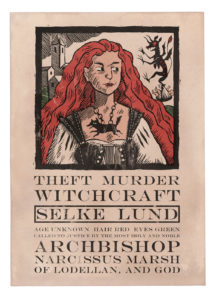 I’m delighted to announce that I’ll have a new short story collection out next year via the wonderful PS Publishing, The Best Stories of Angela Slatter. The cover is still in the works but we’ll reveal that as soon as we can (in the meantime, here’s a Kathleen Jennings drawing). The Introduction has been very kindly written by Mr Kim Newman and the cover quotes have come from some of my favourite authors:
I’m delighted to announce that I’ll have a new short story collection out next year via the wonderful PS Publishing, The Best Stories of Angela Slatter. The cover is still in the works but we’ll reveal that as soon as we can (in the meantime, here’s a Kathleen Jennings drawing). The Introduction has been very kindly written by Mr Kim Newman and the cover quotes have come from some of my favourite authors:
“Slatter’s dark fantasies have a bright, burning core of understanding and insight.” ~ M.R. Carey, author of The Girl with All the Gifts and The Boy on the Bridge.
“Angela Slatter’s stories are horrific, mysterious, whimsical, and mischievous. Beautifully written, full of humanity and intelligence, her stories are both timely and timeless in their concerns. This is an essential collection from one of our best.” ~ Paul Tremblay, author of A Head Full of Ghosts and The Cabin at the End of the World.
“Angela Slatter ’s prose is both eloquent and elegant ? which is no mean feat. By turns beautiful and chilling in equal measure, her stories feature characters who live and breathe and leap off the page, while the plots themselves are wholly unique. This book is a gem and you should treasure it as such.” ~ Paul Kane, bestselling and award-winning author of Sherlock Holmes and the Servants of Hell, Monsters and Before.
“Angela has a rare talent for drawing the reader in to her world, with a lyrical, almost fairytale quality to her writing that also shows a sardonic wit to delight the reader. This collection showcases some of her best stories – you need to read it.” ~ Marie O’Regan, author of Bury Them Deep, editor of Phantoms and The Mammoth Book of Ghost Stories by Women.
ToC:
Tin Soldier
Egyptian Revival
Neither Time Nor Tears
No Good Deed
The Little Mermaid, in Passing
But for an L
Ripper
Better Angels
The Heart is a Mirror for Sinners
Our Lady of Wicker Bridge
Reading Off the Curriculum
Change Management
Lavinia’s Wood
Finnegan’s Field
November 3, 2018
The Dark Magazine #42
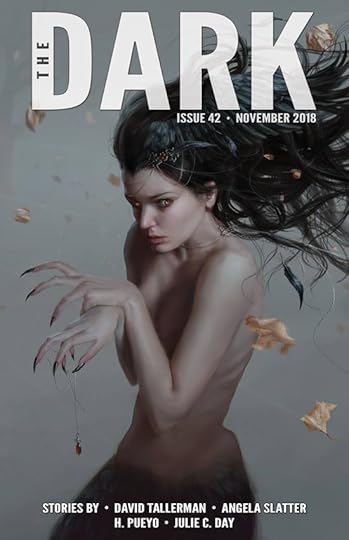 The latest issue of The Dark has four great stories for your reading pleasure.
The latest issue of The Dark has four great stories for your reading pleasure.
“The Only Way Out Lies Farther In” by David Tallerman
“Better Angels” by Angela Slatter (reprint)
“Sea-Crowned” by H. Pueyo
“A Pinhole of Light” by Julie C. Day (reprint)
“How far down, missus?”
The woman’s staring not at the hole in the wet ground, nor at the tall bearded man who’s asked her a question, but back at the house behind her.
She’s half-turned, the top of her torso twisted almost impossibly, almost fluidly, in defiance of the strictures of the steel-stayed corset beneath her plain black dress. The sandstone house is two storeys, wide verandahs running around both levels, walls punctured by doors and floor-to-ceiling windows, all of which are open, their shutters pinned back despite the cold and the rain.
“Missus?” His voice is low and rough, still thick with the accent of his native Bristol, but tender.
Fionnuala Farrell’s eyes are pinned on the small group clustered on the lower verandah: an older woman, plump, dark-haired, with a white apron over her navy frock; three small girls, hair as red-gold as their mother’s, not yet in mourning attire because no one had thought to make any for them so early in their young lives.
October 30, 2018
Halloween #3: (Vaguely) Witchy Things I’ve Written That You Can Read for Free
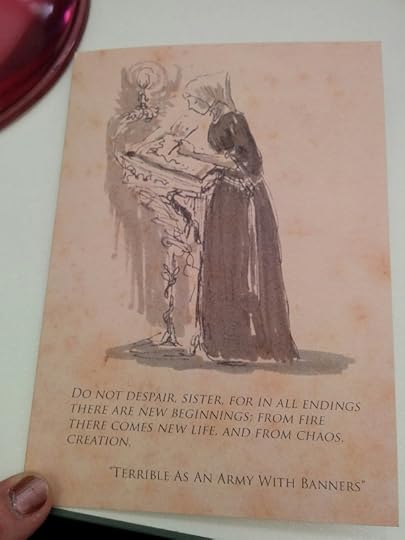
Artwork by Kathleen Jennings for The Bitterwood Bible and Other Recountings
Right, so some more Samhain love: links to (Vaguely) Witchy Things I’ve Written That You Can Read for Free.
Thank you to all the wonderful publishers who’ve loved these stories and sent them out into the world.
St Dymphna’s School for Poison Girls
(Originally appeared in The Review of Australian Fiction, Volume 9, Issue 3, February 2014. Winner of the Aurealis Awards for Best Short Fantasy Story 2014. Translated into Chinese in Science Fiction World, 2018. Reprinted in The Bitterwood Bible and Other Recountings, Tartarus Press, 2014.)
The Coffin-Maker’s Daughter
(Originally appeared in A Book of Horrors, Stephen Jones (ed.), Jo Fletcher Books, September 2011. Winner of the British Fantasy Award for Best Fantasy Short Story 2011. Reprinted in The Bitterwood Bible and Other Recountings, Tartarus Press, 2014.)
Bluebeard’s Daughter
(Originally published in SQ Magazine, Gerry Huntman (ed.), May 2015. Reprinted in The Year’s Best Australian Fantasy and Horror 2015, Liz Grzyb & Talie Helene (eds.), April, 2017.)
Bearskin
(Originally published in The Dark, Sean Wallace (ed.), February 2015. Reprinted in A Feast Of Sorrows: Stories, Prime Books, 2016)
Rising, Not Dreaming
(Originally published in Innsmouth Free Press, February 2011. Translated into Russian in Darker Magazine, August 2015. Reprinted in Weirder Shadows Over Innsmouth, Stephen Jones (ed.), Fedogan & Bremer, October 2013.)
By My Voice I Shall Be Known
(Originally appeared in The Dark, Issue 1, October 2013. Reprinted in The Bitterwood Bible and Other Recountings, Tartarus Press, 2014.)
Brisneyland by Night
(Originally appeared in Sprawl, Twelfth Planet Press, September 2010. Reprinted online at Lightspeed Magazine, August 2013.)
It’s Halloween #2
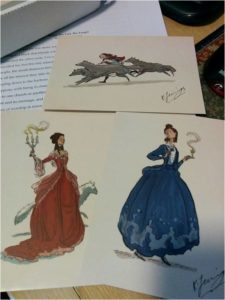
Artwork by Kathleen Jennings (as pretty much always)
So, in honour of the doors between worlds opening this eve, and all manner of things walking through, here is an older story of mine, “Words” (first published in The Lifted Brow # 5, June 2009). Enjoy!
Words
By Angela Slatter
She was a writer, once, before the words got out of hand.
She would read aloud what she’d written that day, dropping sounds into the night, into the sometimes balmy, sometimes frosty air. After a while, she noticed that the words seemed to warm her no matter what the season.
Her voice became stronger, so soon she could read for longer. The sentences took on a life of their own, prancing and weaving themselves into the shapes of the things they described. She was always busy concentrating on those words that stayed obediently on the page, but one night, something caught her eye. A flowing diphthong movement, the graceful pivot of an elision as they wrapped themselves around each other and turned into a small, pale pink dragon, which then disappeared with a slight pop.
She knew, then, that she’d become something other than a writer. The word “wordsmith” had hidden itself away in protest against misuse about three hundred years ago and refused to come out. The word “witch” appeared but she ignored it, thinking it best.
Her house and the house next door were quite close – you could look out the window of one almost into the window of the other. Three children lived there, two little girls and a boy. They knew about the words before she did, had been watching nightly for some time. Their parents had been pleased – indeed so relieved as to not be pricked by suspicion – when they started going to bed at the prescribed hour without protest.
It gave the children time to brush their teeth, struggle into their pyjamas, get tucked in by their parents, and for George to sneak out of his room, across the hallway into his sisters’ and for them all to take their places on the edge of Sally’s bed just before the writer settled down on the old green velvet couch in her living room. Rose would hand out the hard sweets, the fruity ones that could be sucked on for almost an hour before they dissolved into a sugary puddle in the mouth. Unless Sally crunched down on hers (which she frequently did); then, she would chew noisily on the friable shards and beg Rose for another, promising not to do it again.
It may have gone on for years, until the children grew sick of enchantment or the writer died or someone moved away. It might have gone on forever if it hadn’t been for the wolf. The writer rewrote Little Red Riding Hood, which was Rose’s favourite story and the one that frightened Sally the most, so when the wolf swirled into being in the middle of the sitting room, grey and shaggy and rather larger than the word-creatures usually were, Sally screamed.
It still could have been okay had their parents not been walking past the bedroom. Their father flung open the door before the children had a chance to get away from the window, before George could duck under a bed, and before the word-wolf had time to dissipate with a half-hearted snarl.
The parents put their children to bed, all in George’s room on the other side of the house. They held a discussion. They went next door and knocked.
“We don’t like it,” said the mother.
“We don’t like what you do,” the father said.
“They’re fairytales,” explained the writer.
“They’re not…” hissed the mother, “not normal! Stop or we’ll tell.”
“Tell whom?” asked the writer. “And what would they do? It’s a long time since the age of torches and pitchforks.”
The parents didn’t think this was funny at all. The mother rang the Neighbourhood Watch chairman, Mrs Finnerty, who was also on a Committee for Moral Hygiene (though no one seemed to know what that was).
The mother told Mrs Finnerty what they’d seen; she also said that the writer walked around naked a lot. Mrs Finnerty (whose husband had run away with a young nudist) found her doubts about the word-creatures overcome when she heard about the nakedness.
Letters began to arrive for the writer, insisting she desist. She read the first two; tore up the rest as soon as she drew them out of the letterbox, recognised the stiff, off-white envelopes, ripped them up right in her front yard so the whole neighbourhood could see. She threw the pieces into the air and even if it were a still day, a breeze would start up and carry the pieces of torn envelope and letter into the gardens of her neighbours. The ones that wafted to Mrs Finnerty’s always managed to land on her doormat and spell out rude words. In spite of herself, Mrs Finnerty started yelling some of those rude words back, coupling them with ”witch”.
The writer kept reading out her stories, the word-creatures becoming more and more realistic, staying longer before the inevitable pop. She started concentrating on landscapes, too, and buildings, so small villages would spring up on the carpet in her living room, with tiny people wandering the cobbled streets, carts pulled by donkeys, vendors arguing with customers in the markets; and all making a tremendous noise for their size until they disappeared.
The police were called but they weren’t sure what they could do. They (a fat sergeant and two thin young constables) spoke with the writer and she smiled and laughed and refused to stop. She wasn’t disturbing the peace, she was in her own home, and as far as they were aware, there was no legislation against writing this way. To the disappointment of his companions, the sergeant reluctantly refused her offer of coffee and cake and went next door.
They watched from Sally and Rose’s bedroom window, with the neighbourhood parents and Mrs Finnerty all crowded in behind them. One of the young policemen found the discarded bag of candy under Sally’s pillow (where Rose had stuffed it on that fateful night), surreptitiously put one in his mouth, and sucked at it.
As they watched, the clock clicked over to eight-thirty and a chime sounded, deep and sonorous. The writer came into her living room, gave the audience a small smile and shuffled the papers in her hands, rather like someone preparing to give a speech at a hostile debating society. She wore a long dress, green and flowing – the young policeman sucking on his sweet rather hoped it was a bathrobe that she would discard fairly soon – and her hair was caught up and covered by a scarf.
She turned her back to the window and began to murmur; this evening she did not use her clear reader’s voice to project the story, but the word-creatures came all the same. Fairies, dragons, wolves, striped sheep and tuxedoed bears, candy-covered trees, men made of tin and women of cloud, and finally, a door.
It was a perfectly normal door if a little ornate, dark-wooded and banded with iron engraved with stylised holly. It was stout and it stayed. The neighbours and police saw her reach for the handle and turn it. The door opened and they could all see hills, sky, apple trees, and a cottage with many windows, many rooms. The writer turned and smiled and as she did so they saw their children, twenty-seven in all from teenagers to babies, with Sally and Rose and George in the forefront.
The children waved to their parents and stepped through the door, one by one until only the writer remained. Parents screamed.
Soon, police and parents were battering at the writer’s house. She heard the windows break, the wood tear as men as angry as bears broke through the door. She saw the young policeman still sitting on the edge of Sally’s bed, his mouth slightly open, the candy wet and just visible between his lips. She stepped through the door and closed it just as the first parent staggered into the room.
In their rage, they burned the house, but some nights you can see shades and shadows dance around the big tree in the yard. And the young policeman comes by sometimes, to sit beside the blackened ruins and watch in hope of a door.
###
It’s Halloween #1
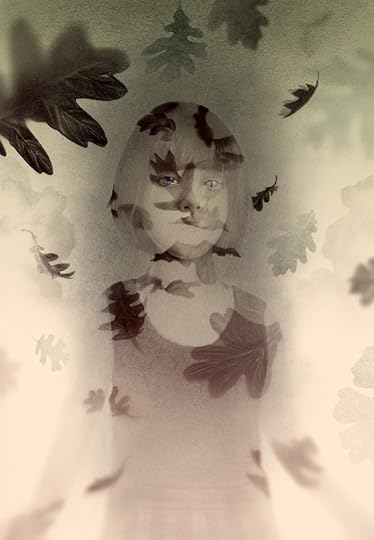 Just been reminded of this fabulous illustration by the wonderful Mr Greg Ruth for my novelette, Finnegan’s Field.
Just been reminded of this fabulous illustration by the wonderful Mr Greg Ruth for my novelette, Finnegan’s Field.
It also accompanied the excellent essay, Why Horror is Good for You (and Even Better for Your Kids), by said wonderful illustrator!
So there you are: two free reads for Halloween! You’re welcome.
A Book of Horrors – Italian Translation
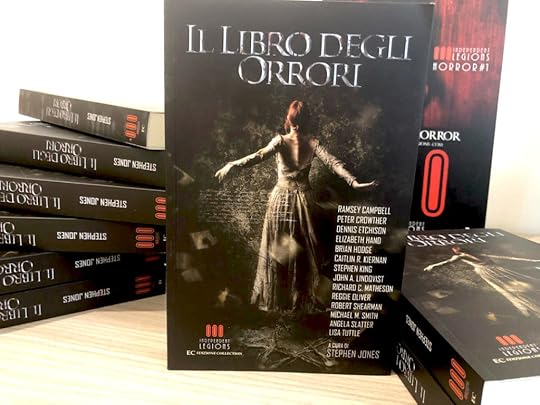
So delighted!! My first translation into Italian – that’s “The Coffin-Maker’s Daughter” in there.
A beautiful new Italian limited edition of A BOOK OF HORRORS from Alessandro Manzetti’s Independent Legions Publishing.
Contains stories by: stories by Ramsey Campbell, Peter Crowther, Dennis Etchison, Elizabeth Hand, Brian Hodge, Caitlín R. Kiernan, Stephen King, John Ajvide Lindquist, Richard Christian Matheson, Reggie Oliver, Robert Shearman, Michael Marshall Smith, Angela Slatter and Lisa Tuttle.



